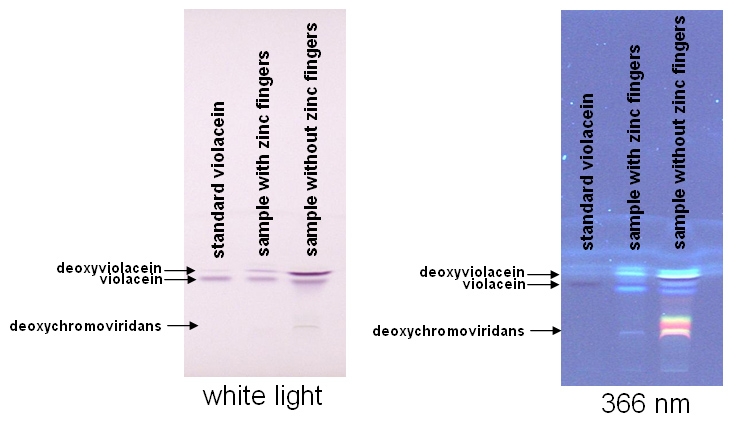Cells containing parts with Part:BBa_K323135 and Part:BBa_K323132 were transformed with Part:BBa_K323066 or Part:BBa_K323153 or a commercial pBluescript plasmid without a DNA program. Cultures were incubated at 30°C for several days and samples were taken at various times. Violacein was extraced from individual samples to analyze the products and evaluate the yield of violacein production.

Figure: Bacterial cultures carrying parts BBa_K323135 and BBa_K323132 and containing a DNA program or a scrambled DNA program or no DNA program. Cultures of bacteria carrying parts with
Part:BBa_K323132,
Part:BBa_K323135 and i) plasmid containing a DNA program
Part:BBa_K323066, ii) plasmid containing a scrambled DNA program
Part:BBa_K323153 and iii) pBluescript plasmid without a DNA program were incubated at 30°C in a Luria Bertani media. The color of the culture containing the plasmid with the DNA program is notably more purple than the color of other two cultures.

Figure: Violacein extracts of bacterial cultures carrying parts BBa_K323132 and BBa_K323135 and containing a DNA program or a scrambled DNA program or no DNA program. Violacein was extracted from the incubated cultures. An extensive difference in color intensity is visible among the extracts of all three cultures, among which the extract of the culture containing a plasmid with the DNA program exhibits the most intensive purple color.
By measuring the concentrations of violacein in the extracts of taken samples, we determined that yield of violacein production in our system increased 6-fold in comparison to an E. coli strain containing a plasmid without a DNA program.

Figure: Violacein concentrations measured at various times through the experiment. The results above show that cultures containing the DNA program produce violacein more efficiently.

Figure: Violacein concentrations at the end of the experiment. The production of violacein was increased 6-fold in comparison with the culture without a DNA program.
In addition, the 2010 iGEM team Slovenia have shown that a DNA program-mediated biosynthesis decreases formation of an unwanted side product deoxychromoviridans. We have analysed the products of the vio operon (Part:Bba_K274002) with HPLC, TLC and mass spectrometry (for detailed description see the 2010 iGEM team Slovenia [http://2010.igem.org/Team:Slovenia/METHODS_and_PARTS wiki]).

Figure: Silica gel plate of culture extracts. The extract of the culture without a DNA program displayed three bands: a violacein, a deoxyviolacein and a deoxychromoviridans band. The extract of the culture containing the DNA program contained only violacein and small amounts of deoxyviolacein, while no deoxychromoviridans could be detected in the sample.
Applications of BBa_K323132
User Reviews
UNIQ93e614ec36fa0979-partinfo-00000000-QINU
UNIQ93e614ec36fa0979-partinfo-00000001-QINU





